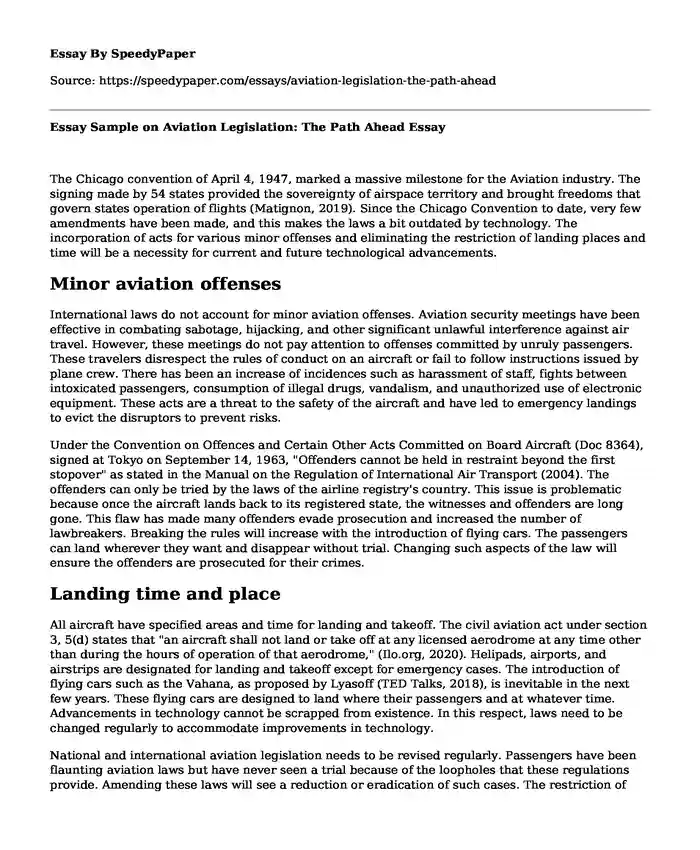
| Type of paper: | Research paper |
| Categories: | Law Aviation Airline industry |
| Pages: | 3 |
| Wordcount: | 668 words |
The Chicago convention of April 4, 1947, marked a massive milestone for the Aviation industry. The signing made by 54 states provided the sovereignty of airspace territory and brought freedoms that govern states operation of flights (Matignon, 2019). Since the Chicago Convention to date, very few amendments have been made, and this makes the laws a bit outdated by technology. The incorporation of acts for various minor offenses and eliminating the restriction of landing places and time will be a necessity for current and future technological advancements.
Minor aviation offenses
International laws do not account for minor aviation offenses. Aviation security meetings have been effective in combating sabotage, hijacking, and other significant unlawful interference against air travel. However, these meetings do not pay attention to offenses committed by unruly passengers. These travelers disrespect the rules of conduct on an aircraft or fail to follow instructions issued by plane crew. There has been an increase of incidences such as harassment of staff, fights between intoxicated passengers, consumption of illegal drugs, vandalism, and unauthorized use of electronic equipment. These acts are a threat to the safety of the aircraft and have led to emergency landings to evict the disruptors to prevent risks.
Under the Convention on Offences and Certain Other Acts Committed on Board Aircraft (Doc 8364), signed at Tokyo on September 14, 1963, "Offenders cannot be held in restraint beyond the first stopover" as stated in the Manual on the Regulation of International Air Transport (2004). The offenders can only be tried by the laws of the airline registry's country. This issue is problematic because once the aircraft lands back to its registered state, the witnesses and offenders are long gone. This flaw has made many offenders evade prosecution and increased the number of lawbreakers. Breaking the rules will increase with the introduction of flying cars. The passengers can land wherever they want and disappear without trial. Changing such aspects of the law will ensure the offenders are prosecuted for their crimes.
Landing time and place
All aircraft have specified areas and time for landing and takeoff. The civil aviation act under section 3, 5(d) states that "an aircraft shall not land or take off at any licensed aerodrome at any time other than during the hours of operation of that aerodrome," (Ilo.org, 2020). Helipads, airports, and airstrips are designated for landing and takeoff except for emergency cases. The introduction of flying cars such as the Vahana, as proposed by Lyasoff (TED Talks, 2018), is inevitable in the next few years. These flying cars are designed to land where their passengers and at whatever time. Advancements in technology cannot be scrapped from existence. In this respect, laws need to be changed regularly to accommodate improvements in technology.
National and international aviation legislation needs to be revised regularly. Passengers have been flaunting aviation laws but have never seen a trial because of the loopholes that these regulations provide. Amending these laws will see a reduction or eradication of such cases. The restriction of places and time of landing and takeoff will also inconvenience the functioning of the flying cars. Accommodating this new technology will prompt the amendment of the law. A review of several of these sections will bring a smooth transformation into the technology of the future.
References
Ilo.org. (2020). Retrieved 20 March 2020, from https://www.ilo.org/wcmsp5/groups/public/---ed_protect/---protrav/---ilo_aids/documents/legaldocument/wcms_132635.pdf.
Mandi, T. (2020). Luggage Restrictions for Travel to China. Travel Tips - USA Today. Retrieved March 19, 2020, from https://traveltips.usatoday.com/luggage-restrictions-travel-china-30301.html.
Manual on the Regulation of International Air Transport. (n.d.). Retrieved 19 March 2020, from http://www.icao.int/Meetings/atconf6/Documents/Doc 9626_en.pdf
Matignon, L. de G. (2019, June 18). The Chicago Convention of 1944. Retrieved 19 March 2020, from https://www.spacelegalissues.com/space-law-the-chicago-convention-of-1944/
Sochor, E. (1991, January 1). The Chicago Conference Revisited: The Record and Legacy. Retrieved 19 March 2020, from https://link.springer.com/chapter/10.1007/978-1-349-11347-7_1
TED Talks. (July 20, 2018) "How Autonomous Flying Taxis Could Change the Way You Travel | Rodin Lyasoff." Youtube. https://www.youtube.com/watch?v=1g-1_Y3fvUg
Cite this page
Essay Sample on Aviation Legislation: The Path Ahead. (2023, Apr 24). Retrieved from https://speedypaper.com/essays/aviation-legislation-the-path-ahead
Request Removal
If you are the original author of this essay and no longer wish to have it published on the SpeedyPaper website, please click below to request its removal:
- Democracy in America Essay for Free Use
- Learn More about Preschoolers and Nutrition in Our Essay
- Essay Sample on the Inquisition's First Targets
- The Namesake - Summary and Analysis of the Novel
- Free Essay: Public Transportation Better Than Using Private in Miami, Florida
- Essay Example on Young Girls and Media: Adverse Effects on Self-Image
- Essay Example on God's Grace Is It Enough?
Popular categories




